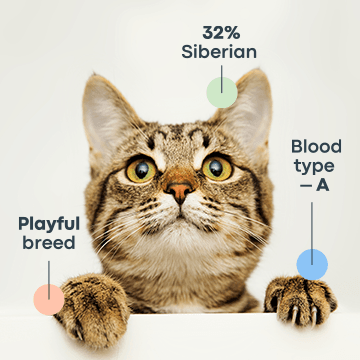Cats, with their sharp senses and keen instincts, have always been creatures of great mystery and intrigue. But when we speak to them, is it just one-sided chatter, or do our pets truly comprehend what we're saying? The question "Do cats understand words?" has intrigued cat lovers and animal behaviorists for decades.
Recognition Over Understanding
While cats may recognize certain words and phrases due to repetition and association, it doesn't mean they understand the language like humans do. For instance, a cat might come running at the sound of a can opener or the word "treat," but this is more about recognizing a familiar sound that often precedes a reward rather than understanding the word's meaning.
Tone and Emotion
Beyond specific words, cats can pick up the tone and emotion in our voices. A calm and soothing voice can be comforting, while a harsh or loud tone might be alarming. This indicates that while the semantics of our language might be lost on them, the emotional undertones are not.
How Many Words Do Cats Understand?
Cats, much like humans, have varying levels of intelligence and perceptiveness. While some cats might be more attuned to human speech, others might be less receptive. However, on average, cats can recognize certain words, mainly if they're associated with actions or routines they're familiar with. For instance, words like "treat," "come," or "bedtime" might be more quickly recognized by our feline friends because of the actions that usually follow these commands.
Again, cats associate the word's sound with a particular outcome or reaction. Their comprehension is more about tone and association than actual linguistic understanding.
How Should I Communicate With My Cat?
Cats have their own way of communicating with each other. It's beneficial to adopt communication strategies that align with their natural inclinations and abilities.
Non-verbal Communication
Cats primarily communicate through body language. A raised tail usually indicates a happy and confident cat, while a tucked tail might mean the cat is scared. Observing your cat and responding to its non-verbal cues can create a deeper bond and understanding. Mirroring your cat's body language can also be a form of communication. For example, slow blinking can signify trust and affection among cats. If you slowly blink at your cat and they return the gesture, it's a form of silent communication.
Consistent Sounds and Words
If you're trying to get your cat to associate a word with an action, consistency is crucial. Always use the same word with the same tone for specific actions or items. Over time, this consistency can help your cat recognize and react to certain commands or phrases.
Positive Reinforcement
Cats, like many animals, respond well to positive reinforcement. If your cat does something desirable, immediately rewarding them with affection, praise, or a treat can reinforce that behavior. Pairing specific words with these positive experiences can help them recognize and respond to those words in the future.
Stay Calm and Be Patient
Cats can easily become overwhelmed or scared if faced with loud noises or aggressive behavior. When communicating with your cat, maintain a calm mood and gentle tone. If you're training or trying to teach them something new, patience is vital. Keep in mind that they're not ignoring you out of hate. They just have a different way of understanding the world.
Do Cats Like Being Talked To?
Most cat owners can attest that felines seem to enjoy being spoken to. Cats are often more receptive to the tone and rhythm of our speech than the actual words. A soft, gentle voice can be comforting and soothing to a cat, whereas a loud or angry tone can be unsettling or even frightening.
It isn't really about the words, it's about the emotions and intent behind them. Cats can't understand all the nuances of human language, but they can feel emotions and sense your mood.

Do Cats Know Their Names?
Research has indicated that cats can recognize their names, especially if used consistently. When you consistently call your cat by their name and then reward them with attention, treats, or play, the cat begins to associate that particular sound (their name) with positive outcomes.
How to Teach Your Cat Their Name: Tips for Effective Training
It is not an easy thing sometimes to teach a cat their name, but we will give you some tips to make it easier.
Consistency is Key
Try to use the same name for your cat without any variations or nicknames.
Positive Reinforcement
Whenever your cat responds to their name, reward them with a treat or affection. This creates a positive association with their name.
Practice Makes Perfect
Regularly call your cat by their name, ensuring that you have their attention. Over time, repetition will help reinforce the association.
Keep Training Sessions Short
Cats have relatively short attention spans. Keep sessions brief but consistent to ensure they stay engaged.
Cracking the Code of Communication
So, can cats understand humans? While they might not grasp the full spectrum of human language, they are undoubtedly attuned to our emotions, tones, and certain words or phrases consistently associated with particular outcomes. With patience and consistent communication, we can start understanding each other much better.
Frequently Asked Questions
What words do cats understand?
Cats often recognize words associated with specific actions or routines, such as "treat," "come," or "bedtime," primarily through tone and repeated associations.
Do cats understand words? Do cats understand the word no?
While cats might not understand "no" as humans do, they can recognize its tone and associate it with a negative or stopping response, especially if used consistently.
Do cats know when I talk to them? Do cats understand humans?
Yes, cats are attuned to their owner's voice and can distinguish when spoken to, particularly noticing tone and rhythm.
Can my cat understand me when I meow?
While your cat recognizes your voice, imitating a meow might not convey the same meaning as a cat's natural meow, but it can pique their curiosity or attention.





